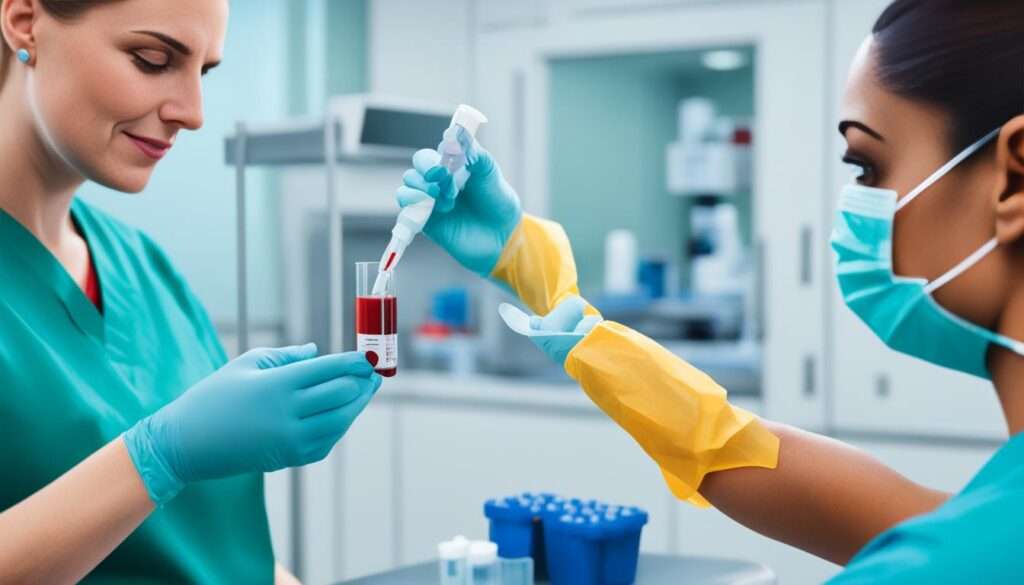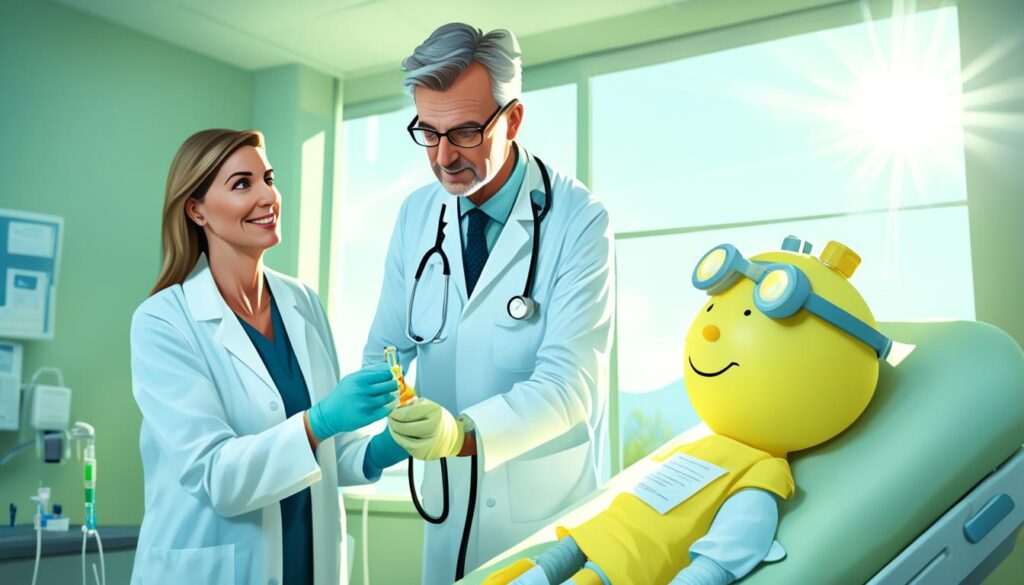Jaundice is a condition that can affect adults. It’s important to know the common causes and how to prevent it. This condition makes the skin, whites of the eyes, and mucous membranes turn yellow. This happens when there’s too much bilirubin in the blood.
Table of Contents
ToggleThere are many medical conditions that can cause jaundice. Finding and treating the main cause is key to managing it.
This article will look into the main causes of jaundice and how to prevent it. By understanding the causes and taking action, you can keep your health in check.
Overview of Jaundice
Jaundice is a condition that makes the skin, mucous membranes, and the whites of the eyes turn yellow. This happens when there’s too much bilirubin in the body. Bilirubin is made when old red blood cells break down.
Definition and Symptoms
Understanding jaundice means knowing what it is and its symptoms. It can happen to anyone and is often linked to liver or bile duct problems. The main signs of jaundice are:
- A yellow tinge to the skin and the whites of the eyes
- Pale, clay-colored stools
- Dark, tea-colored urine
- Itchiness of the skin
The severity of jaundice symptoms can vary. It’s important to see a doctor if you think you or someone else might have what is jaundice.
What Causes Jaundice
Jaundice happens when the body makes too much bilirubin or can’t get rid of it. Knowing why jaundice occurs helps find the right treatment.
Here are some main reasons for jaundice:
- Liver Diseases and Infections: Issues like hepatitis, cirrhosis, and liver cancer can mess up the liver’s bilirubin work. This leads to jaundice.
- Gallstone Obstructions: Gallstones can block the bile ducts. This stops bile from flowing right, causing bilirubin to build up and turn skin yellow.
- Certain Medications: Some drugs, including over-the-counter ones and herbal supplements, can make the liver work wrong. This can cause jaundice.
- Excessive Alcohol Consumption: Drinking too much alcohol can hurt the liver. It makes it hard for the liver to break down bilirubin, leading to jaundice.
It’s important to find and treat the cause of jaundice. If you have jaundice symptoms, see a doctor for help. They can give you the right treatment and advice.
Underlying Conditions Triggering Jaundice
Jaundice makes the skin and eyes look yellow. It’s often linked to liver and bile duct issues. Knowing the causes helps with diagnosis and treatment. Liver diseases and infections and gallstone disease and obstructions are big reasons for jaundice.
Liver Diseases and Infections
Viral hepatitis jaundice comes from hepatitis A, B, C, D, or E. It inflames and damages the liver, making it hard to process bilirubin. Long-term liver disease jaundice, like cirrhosis or liver cancer, also builds up bilirubin, turning skin yellow.
Gallstone Disease and Obstructions
Gallstones jaundice is another reason for jaundice. Gallstones block the bile ducts, stopping bile flow. This causes bilirubin to build up, leading to obstructive jaundice. Tumors or other blockages in the bile ducts can also cause jaundice.
It’s key to know what causes jaundice to get the right medical help. If you see jaundice signs, see a doctor fast. They can find the cause and start treatment right away.
Diagnosing Jaundice
Healthcare professionals use a detailed method to diagnose jaundice. They begin with a physical examination. They look for signs of jaundice and check the abdomen and liver. This helps them find possible causes.
Then, they order laboratory tests to learn more. These tests include bilirubin tests, blood counts, and liver function checks. These tests are key to understanding jaundice’s cause.
Imaging Studies for Jaundice
At times, doctors suggest imaging studies for a better look. These can be ultrasound, CT, or MRI scans. They help spot problems in the liver or bile ducts that might be causing jaundice.
By using physical exams, tests for jaundice, and imaging, doctors can create a detailed plan for treatment. This approach helps ensure the patient gets the right diagnosis and care.

Treatment Options for Jaundice
Managing jaundice means treating the cause and easing symptoms. We’ll look at the different ways to help those with this condition.
Addressing the Underlying Cause
The first step in treating jaundice is finding out what’s causing it. This could be due to liver diseases, infections, or other health issues. Treatment might include:
- Medications to treat liver diseases or infections
- Surgical procedures to remove gallstones or clear obstructions
- Other interventions to address the primary health issue
By tackling the main cause, doctors can help cure jaundice and prevent more problems.
Managing Jaundice Symptoms
While treating the cause, there are ways to ease jaundice symptoms. You can:
- Use over-the-counter medicines for itchiness or discomfort
- Apply moisturizers or creams on dry, irritated skin
- Avoid alcohol and some medicines that make jaundice worse
- Eat a healthy, balanced diet to support liver health
By dealing with both the cause and symptoms, people with jaundice can feel better and recover fully.

Jaundice in Newborns
Jaundice makes the skin and eyes look yellow and happens in about 60% of newborns. It’s caused by the breakdown of red blood cells and the liver’s immaturity in dealing with bilirubin. Newborn jaundice is usually not a big deal, but knowing the causes and how to treat it is key.
Causes and Risk Factors
Blood type differences between a baby and its mother, and breastfeeding issues, are top causes of jaundice. Other risks include being born too early, internal bleeding, and some genetic conditions.
Treatment and Prevention
Phototherapy is often used to treat jaundice in babies. It uses special blue lights to break down bilirubin. For severe cases, a blood transfusion might be needed. To stop jaundice before it starts, regular check-ups, breastfeeding help, and managing any health issues are important.
Preventing Jaundice
Some cases of jaundice can’t be avoided because of health issues. But, you can make lifestyle changes to lower your risk. By being proactive, you can protect your health and reduce the chance of getting jaundice.
Maintain a Balanced Diet
Eating right is key to avoiding jaundice. Eat foods full of vitamins, minerals, and antioxidants like fruits, veggies, whole grains, and lean meats. Cut down on fatty and processed foods as they can harm your liver and lead to jaundice.
Stay Active
Exercise is great for your health and helps prevent jaundice. It boosts liver function and aids in detox. Try to do at least 30 minutes of moderate exercise like walking, swimming, or cycling every day.
Limit Alcohol Consumption
Drinking too much alcohol increases jaundice risk. If you drink, do it in moderation. Alcohol can inflame and damage your liver, making jaundice more likely.
Avoid Toxins
Toxins like chemicals, pollutants, and some medicines can cause jaundice. Reduce your exposure by using safe cleaners, avoiding secondhand smoke, and following your meds’ instructions carefully.
These lifestyle changes can help prevent jaundice and keep your liver healthy. Remember, prevention is crucial, and small steps can make a big difference in your health.
Complications of Untreated Jaundice
Ignoring jaundice can lead to serious problems, especially for newborns. A rare brain damage called [https://www.arfaalawgroup.com/untreated-jaundice-complications.html]kernicterus is one of the worst outcomes. This happens when bilirubin, the pigment causing jaundice, damages the brain.
Also, the conditions that cause jaundice, like liver diseases or blocked gallstones, can get worse without treatment. This may cause more health issues that need quick medical care. Untreated jaundice can also raise the chance of seizures, hearing loss, and permanent brain damage.
- Kernicterus: A rare but serious form of brain damage caused by high bilirubin levels
- Worsening of underlying conditions: Untreated jaundice can exacerbate liver diseases and gallstone obstructions
- Increased risk of seizures, hearing loss, and brain damage
Ignoring the risks of untreated jaundice can have terrible effects. If you or your child has jaundice, getting medical help quickly is key. [https://www.arfaalawgroup.com/untreated-jaundice-complications.html]The dangers of not treating jaundice are too great to ignore.
Conclusion
Jaundice is a common condition with many possible causes, like liver diseases, infections, or gallstone blockages. It’s important to know what can cause it, spot the signs early, and prevent it. By finding and treating the main cause, you can beat jaundice and avoid serious problems.
Early detection and the right treatment are key to dealing with jaundice. Regular health checks, making healthy lifestyle choices, and fixing any health issues can help prevent jaundice. Always put your health first and take steps to protect it.
Understanding jaundice’s causes, prevention, and treatment helps you make smart health choices. Stay alert and get medical help if you see any signs of jaundice. This way, you can keep your health in top shape.
FAQ
What is jaundice?
Jaundice makes the skin, whites of the eyes, and mucous membranes turn yellow. This happens when there’s too much bilirubin in the blood.
What are the common symptoms of jaundice?
Symptoms include yellow skin and eyes, pale stools, dark urine, and itchiness.
What are the common causes of jaundice?
Causes include liver diseases, gallstone blockages, some medicines, and too much alcohol.
How is jaundice diagnosed?
Doctors use physical exams, blood tests, and imaging like ultrasound or MRI to diagnose jaundice.
How is jaundice treated?
Treatment targets the underlying cause, like liver disease or gallstones. It may involve medicines, surgery, or other treatments to manage symptoms.
What are the common causes of jaundice in newborns?
Newborn jaundice comes from red blood cell breakdown and the liver’s immaturity. Blood group incompatibility and breastfeeding can also increase the risk.
How can jaundice be prevented?
Eating well, exercising, drinking less alcohol, avoiding toxins, and managing medicines can help prevent jaundice.
What are the potential complications of untreated jaundice?
Untreated jaundice can cause serious issues, like kernicterus in babies. It can also make liver diseases or gallstone blockages worse, leading to more health problems.


